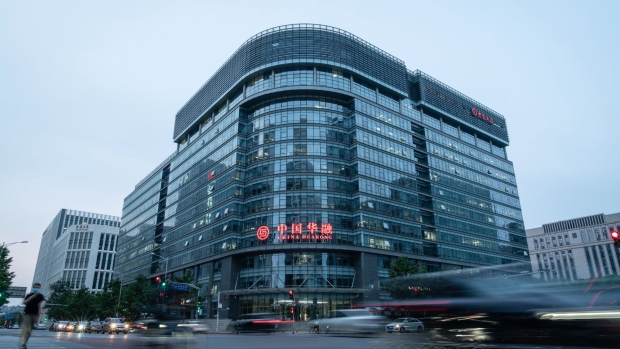Jun 16, 2021
Huarong Puts Multiple Units On Sale in Major Downsizing Push
, Bloomberg News

(Bloomberg) -- China Huarong Asset Management Co. is ramping up efforts to sell nearly all its local units outside of distressed debt, part of a government-approved downsizing plan to bolster the embattled conglomerate’s finances.
Huarong is soliciting bids and engaging with potential buyers after China’s banking regulator ordered it to accelerate asset sales in April, people familiar with the matter said, asking not to be identified discussing private information. Units with coveted financial licenses -- including banking, securities trading, and leasing -- are among those generating the most interest, the people said.
The units for sale don’t include China Huarong International Holdings Ltd., an offshore entity that issues or guarantees the bulk of Huarong’s dollar bonds, the people said. It remains unclear whether senior Chinese leaders have decided on a long-term plan for the bonds, some of which are trading at levels that imply a high risk of default.
Huarong’s ability to repay hinges partly on how much money it can raise by selling non-core businesses. While profitable units including banking and leasing may be relatively easy to offload, money-losers such as asset management will be tougher. The company’s fragile finances give it limited scope to negotiate for high prices, unless Chinese authorities cajole prospective buyers to pay up. Huarong is majority-owned by the nation’s finance ministry.
Speculation about the company’s fate has been swirling since it missed a deadline to report 2020 results at the end of March. Even though Huarong has continued to repay maturing bonds on time, its 4.5% perpetual notes are trading at about 67 cents on the dollar.
Many investors now view the company as an important test of Beijing’s willingness to backstop government-owned borrowers amid a record wave of defaults. The ruling Communist Party has long put a premium on financial stability, but it also increasingly wants to improve the pricing of risk in local credit markets and wean investors off the assumption that overextended companies will always be bailed out.
Huarong, which has about $21 billion of dollar bonds outstanding, aims to publish its 2020 results by the end of August, one of the people said, sticking with a time line that Bloomberg reported in May. Some of the company’s bonds have provisions that could lead to a technical default if it doesn’t release financial statements by then.
Huarong and the China Banking and Insurance Regulatory Commission didn’t respond to requests for comment.
One of the conglomerate’s biggest assets up for sale is a 41% holding in Huarong Xiangjiang Bank Co., people familiar with the matter said. The local Hunan government has expressed interest in buying the stake, one of the people said.
Caixin Media’s WeNews reported on Tuesday that Huarong has started to dispose of seven units in areas including finance and domestic asset management. The company’s total assets will fall to about 1 trillion yuan ($156 billion) from 1.7 trillion yuan, according to the report.
Reuters reported earlier this month that Deutsche Bank AG planned to buy Huarong’s stake in Huarong Rongde Asset Management, citing a person with knowledge of the deal. A spokesman for the German bank later told Bloomberg it has no plans to purchase the stake.
While Huarong’s overhaul efforts have shifted into overdrive in recent months, they trace back to 2018 when then-chairman Lai Xiaomin was accused of bribery in one of China’s biggest-ever financial scandals. The episode led regulators to call for an industrywide revamp. Huarong and China’s three other state-owned distressed debt managers were told to offload non-core assets and focus on their original mandate of disposing of bad loans. Lai was executed in January.
Huarong appointed Liang Qiang as its deputy party secretary this month, gaining an industry veteran to help lead its overhaul efforts.
The company’s most recent financial statements showed it made a 3.9 billion yuan of profit before tax in the first half of 2020, down 42% from a year earlier. Its profitable units include the main distressed debt business, banking, leasing and securities trading.
The asset management and investment segment, which includes Huarong International, reported a pretax loss of 5.6 billion yuan in the first half of 2020. Huarong International said in April that it returned to profit in the first quarter and that all its operating indicators are meeting targets.
©2021 Bloomberg L.P.